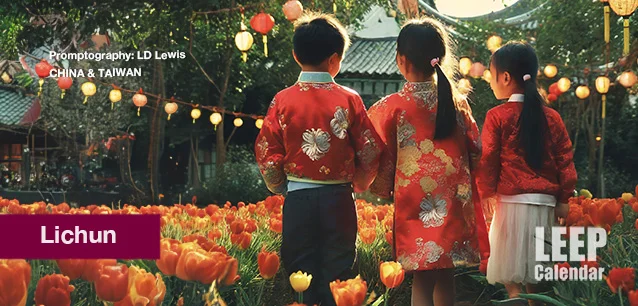 AD
AD
Today is: December 18
Scroll to explore events active on this date.
Additional Events on LEEP
LEEP INK FEATURES

August? Absolutely!
In August, we live through the Dog Days of Summer. It's hot and often humid, and those who can leave for better climates do. Down south, winter is in full force. August is also known as "the ...

In The Heat of July: July 2025 Events
Is it hot enough (or cold enough if you're below the equator) for you yet? There is actually a day for that! Like every month, I pick a diverse collection of events you may or may not know about. This ...

May Blooms: Events in May 2025
Along with October, May is one of the most densely packed months of the year. It's before the summer humidity and the last whole month of the school year. The weather is warming in t...
About Lichun
Food , Animals Fish Insect & Birds
China Japan & Korea
Ends: Feb 19, 2024
DESCRIPTION:
Lichun, traditionally regarded as the start of the lunar new year, holds significant cultural importance in China and Taiwan. Falling typically between February 3 and 5, Lichun is one of the 24 solar terms in the Chinese lunisolar calendar, marking the beginning of spring.
This period heralds the arrival of warmer weather and the earth's awakening, indicating it's time for farmers to begin sowing their fields. The term "Lichun" itself translates to "start of spring," symbolizing new life and renewal. This day was vital in agricultural societies as it intertwines with the planting cycle.
Customs associated with Lichun vary by region but often include a mix of festivities and traditions to ensure good fortune and prosperity for the coming year. In China and Taiwan, families may participate in age-old practices such as the "biting of the spring," where people eat spring rolls or other dishes featuring fresh, seasonal ingredients to bring good luck.
In Taiwan, Lichun has additional practices. It is common for people to observe taboos intended to ward off bad luck, such as avoiding negative words or actions. Celebrants often engage in activities to attract positive energy, like wearing red clothing and giving out red envelopes with money, called "hongbao," particularly to children and unmarried adults.
Celebrants may perform the Dragon Dance and Lion Dance publicly to bring good luck and scare away evil spirits. Moreover, there are temple fairs and other community gatherings where people can pray for a prosperous year, seek blessings, and enjoy the festive atmosphere.
Lichun is not a public holiday in China or Taiwan, but the surrounding customs remain embedded in both societies' cultural fabric. Despite the modernization and urbanization of these regions, Lichun remains a symbolically significant time to celebrate spring's arrival and express hopes for the new year.
VIDEOS
SUPPORTING DOCUMENTS
Currently, this event does not have supporting documents.
ADDITIONAL IMAGES
Currently, this event does not have supporting images.
Where would you like to go now?
 AD
AD


/footer-logo.svg)
